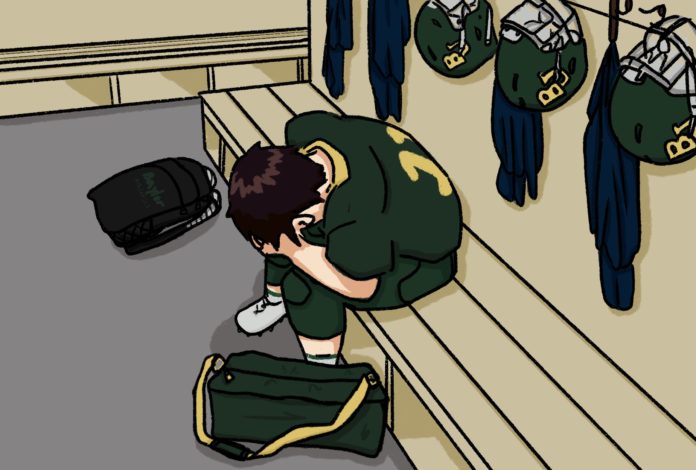By George Schroeder | LTVN Executive Producer
According to the NCAA, just under half of student-athletes said they would be comfortable seeking support from a mental health provider on their campus, and during Mental Health Awareness Week, Baylor Athletics prioritized breaking that stigma.
College football took the opportunity to promote mental health awareness during the same week. Baylor is currently in the middle of its bye week, and head coach Dave Aranda said it’s important for anyone who needs it to ask for help.
“That’s where the struggle is,” Aranda said. “It’s good that there’s a breakthrough that everyone recognizes that it’s a way important piece, and you think about the person over the player. It’s really kind of everything.”
It’s not just college football. Universities across the country have taken large steps to at least start the conversation surrounding mental health. Baylor assistant track and field coach Jeff Chakouian said when he competed, it wasn’t talked about enough.
“To me, it’s really exciting that people are talking about mental health, because the reality is, everyone’s going through something at some point,” Chakouian said. “We need to communicate what’s going on so that I can get you the help and get you the answers to any question and anything that you’re dealing with.”
That passion to pursue help is embedded throughout Baylor’s variety of sports, and it isn’t just at the coaching level. Volleyball’s redshirt freshman outside hitter Riley Simpson said the key to conquering mental health is found in intentionality with your teammates.
“The stigma is stronger within athletics,” Simpson said. “Something that I’ve actually been trying to practice this week is, you can just pick one person that you really want to encourage and then really pour all [of] your effort into them that day.”
Track’s junior sprinter Lily Williams shared Simpson’s sentiment. She said while student-athletes aren’t the only ones who can suffer from mental health issues, they are placed in positions that can result in developing poor mental states if not managed in the right way.
“We’re in an environment with many more stressors,” Williams said. “That can be physical, that can be mental, that can be academic — so we have more opportunities for the stress to really take hold.”
Williams said it was crucial for struggling student-athletes to identify vulnerabilities and prepare for the bigger picture while avoiding what she called “detail-heavy” situations.
“We’re so zoomed in a lot of the time,” Williams said. “Like, how can I make this part of my pitch better? How can I perfect this part of my running form? And that can carry into academics as well, and that can lead to a lot of burnout.”
It’s a balancing act. At the same time, Simpson said it’s crucial to compartmentalize.
“If you could just really control the things that you can control, then it helps you to break down things that might seem bigger than yourself,” Simpson said. ‘You’re not worrying so much about this big daunting task ahead of you; you can just break things down.”
Properly stabilizing both a student’s life and an athlete’s career is necessary to maintain a healthy mental state. To walk that tightrope, Chakouian said people can’t just focus on athletics.
“I try to make sure that all my athletes are feeling ready to go — and not just in throwing, but in life,” Chakouian said. “Because if an athlete that shows up to me [is] just excited to be there because everything in their life’s going well, coaching is really the fun part and really easy.”
According to a survey conducted by the NCAA, the numbers between male and female athletes are generally even across the board, with men being slightly less likely to seek out help. Williams said she sees that play out at Baylor.
“I have a lot of male friends who don’t talk about mental health and don’t feel comfortable talking to their friends about mental health because it makes them look weak,” Williams said.
Williams said the issue isn’t solely the fact that they’re less likely to seek help but also the reason behind why they won’t.
“Does that uncomfortability stem out of these societal norms that say, ‘As a man, you can’t say that you’re not doing OK’?” Williams asked. “Or is that just you don’t want to talk about it?”
Both Williams and Simpson agreed the university was making the right choices on mental health.
“In terms of where we are, Baylor is in a great place,” Williams said. “We’re also very adamant about moving forward as well, so we’re not complacent in where we are.”
The cause is certainly at the forefront of Baylor’s mind. The university announced the establishment of the Student-Athlete Mental Health Endowment on Sept. 30, aiming to ensure access for student-athletes to mental health services.
This is another step in the right direction for student-athletes, but going back to intentionality, Simpson said sometimes people just need to affirm the simple things.
“It’s OK to be a human,” Simpson said. “It’s OK to have off days and off weeks. You don’t have to be spot-on all the time, because that’s really emphasized in sports, and that’s something that’s not so much taught in life.”
She didn’t stop there, saying help is always just one step away.
“I can be a resource,” Simpson said. “If anyone needs to come and talk to me or whatever, I’m happy to listen and be a shoulder to cry on or anything that you need.”






